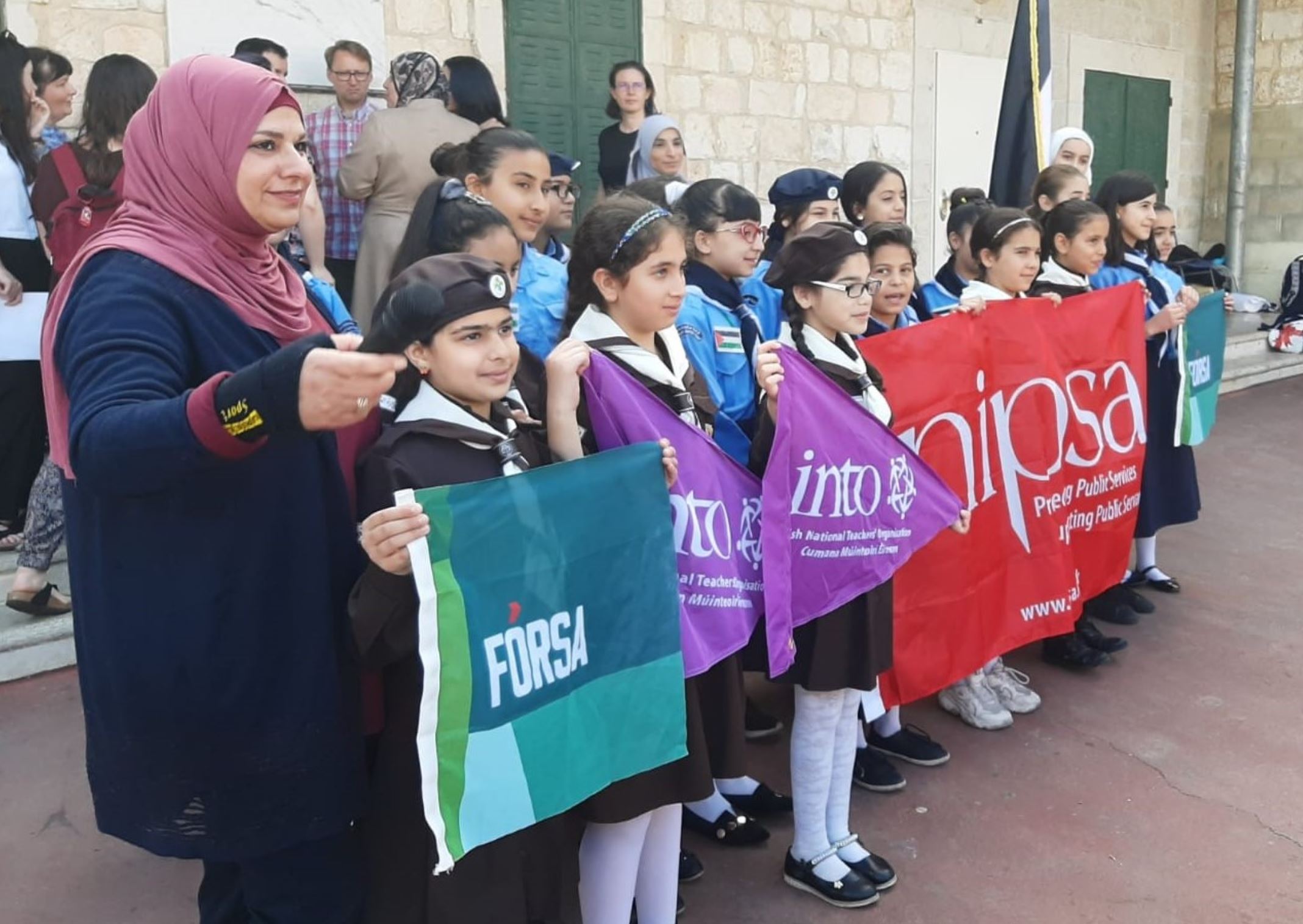Fórsa’s Head of Education Andy Pike has recently returned from a field trip examining Education Provision in the occupied Palestinian territories, organised by the Trade Union Friends of Palestine.
Andy was joined by member activists including school secretary Kathleen O’Doherty, SNAs Annette Murphy and Niamh Jordan and Shelley Healey from the union’s Dún Laoghaire-Rathdown branch.
In a new blog for the Fórsa website Andy describes the warm welcome the delegation received from teachers, children and parents in the schools of East Jerusalem, the West Bank and the Jordan Valley.
They encountered friendly, excited and curious children enjoying an education that is being delivered in the most challenging and hostile circumstances.
Andy writes about how the delegation were not fully prepared for what they found, the dedication of the teaching and other staff they met there and concludes “We can have nothing but admiration for those struggling to provide an education to students under occupation in the most trying of conditions.”
Tension
“The first school we visited was the Al Fataa Al Laji’a Primary School for girls which is just outside the walls of the old city of Jerusalem. As the Israeli authorities refuse permission for the construction of Palestinian schools in East Jerusalem, this school operates in converted residential buildings.
“The school is funded by the Palestinian Authority but its status is not recognised by Israel. The school staff gave us a warm welcome and introduced us to the children. They are the same as children anywhere. Excited, curious and proud of their school and their culture,” he said.
Israeli settlers have occupied the adjacent building and use the same stairwell as students entering and leaving the school.
The Al Wifaq primary school, inside the old city of East Jerusalem situated in a residential building on the first floor. The school is mixed and provides education under the most difficult of circumstances.
Andy describes the unique tension of a school forced to exist in close proximity to Israeli settlers. “The playground is a small internal courtyard with no space for children to run or play. The classrooms are cramped and dark, but are decorated with the same artwork and pictures you see in any classroom in the west.
“Israeli settlers have occupied the adjacent building and use the same stairwell as students entering and leaving the school. This has led to tension and some clashes, deterring parents from sending their children to school.”
West Bank
At the Al Aroub refugee camp near Bethlehem the delegation met with staff in the UN Health Centre to discuss child health issues. “Dr Azziz is in charge of 22 similar facilities across the West Bank, and reported high incidents of anaemia and other medical conditions linked to poor diet and depravation,” Andy explains.
The main health issues affecting children and young people include heightened anxiety, poor mental health, and risks of abuse as well as physiological problems associated with poverty.
The UN is struggling to maintain services in the wake of recent a $400m cut in US funding and will try to maintain primary healthcare across the West Bank, but this effort will come at a cost as the international peacekeeping body will have to draw back from funding secondary or acute hospital care as a consequence.
They visited a school in Hebron situated in the middle of the old town where thousands of Palestinians live in a militarised zone with multiple check points.
Boys were required to lift shirts and show their torso and legs in front of heavily armed soldiers.
“We witnessed teachers and others undergoing several physical checks on their way into work. Perhaps the most distressing spectacle was the treatment of the school children on their way to school. Their bags were searched and contents upturned on inspection benches, boys were required to lift shirts and show their torso and legs in front of heavily armed soldiers.
Dedication
“All our delegates returned with concerns over just how these conditions continue to affect children and their education. The dedication of the teaching and other staff we met was tremendous and we can have nothing but admiration for those struggling to provide an education to students under occupation in the most trying of conditions,” he said.
Andy added that we must redouble our efforts to ensure that Israeli and Palestinian children are given equal life chances. “Education offers hope of a better life, such hope is scarce in Palestine and those sustaining hope deserve our wholehearted support.”
Fórsa is affiliated to the Boycott Divestment Sanctions (BDS) campaign. Find out more at the campaign’s website.
Read Andy’s full account of the Palestine visit HERE.

